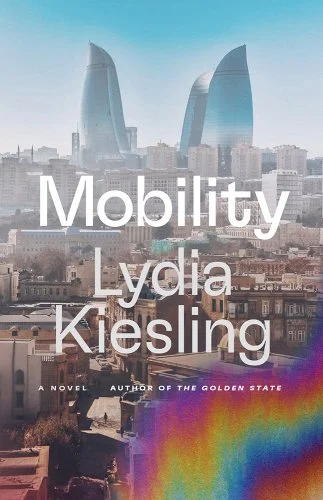In Mobility, Bunny, as aptly named as Jay Gatsby and Elle Woods, is the daughter of a public affairs officer in foreign service. “Silly but not stupid,” she splits her adolescence between boarding school and posts in Greece and Azerbaijan. Mostly, Bunny thinks of material possessions, teen soaps like Dawson’s Creek, thinness, and older white boys in boat shoes and Nantucket reds who, if not individually attractive, are “gorgeous in the aggregate.” Unambitious yet connected, she lands a position as an administrative assistant for an engineering company. Through her early twenties, she is surrounded by the “inelegant comfort of Costco millionaires” and men who have answers even when they don’t, and who deliver their thoughts in unbroken monologue. Soon enough, leadership is impressed by her potential, and Bunny is poached to join the tech-forward branch of Turnbridge Energy, a family-owned business engaging in exploration and production in the oil complex. Continued advancement for Bunny—her tiny piece of the pie—means graduating from Banana Republic to Louboutin, Tory Burch, Biologique Recherche, Goyard—a bag that Bunny learns to covet—and from Bunny to Elizabeth.
We watch Bunny evolve over decades, in bed with oil tycoons who speak not about political seasons but geologic time. Rarely does Bunny consider her own culpability in the destruction of the planet, even after her own family benefits from enhanced oil recovery of inherited land—and when she does, she consoles herself with same self-justified platitudes pushed by big oil, or takes comfort in the fact that she is blazing a trail for women in the industry or the illusion that one day the industry will pivot to clean energy. Americanness, in this book and this character, is defined as a refusal to interrogate what one has or what one wants, even in the face of a threatened existence.
Kiesling has a wonderful eye for glut and hypocrisy, as when the reader is confronted by eighteen rolls of paper towels in a Texan home, yet she is sympathetic towards Bunny, who like so many others is trapped by American consumerist values and the hegemony of the oil complex. Everyone does business with Halliburton here, Kiesling writes, everyone’s hands are black. We’re warned that by 2030, Mecca will be too hot for the hajj. We’re reminded that most petrostates, in the wake of colonialism, don’t have the resources and infrastructure to manage their own oil reserves. We’re forced to think about how most of what we wear comes from cotton grown in Central Asia, much of it processed through forced labor.
The perils and urgency of divesting from the carbon economy are undeniable and dire—yet we get the creeping sense that, with our self-justifications, our fast fashion and flights to Europe, our skin regimens and unsatisfied appetites, we have much more in common with Bunny than we once believed.
Annie Liontas: Mobility is a book about unintended consequences and wishful thinking. Tell us about Bunny. How is her blindness and privilege our own?
Lydia Kiesling: In Bunny’s world, there are very strong ideals about work. Ascension, upward mobility—you have to find the job that helps you climb the ladder. This was fundamental to the way that people I went to school with were brought up to think about the future. For women, even if you are coming from a position of privilege, you start to understand that the ladder doesn’t quite work as we’re meant to believe. A lot of people, when faced with that information, are not going to burn the ladder down or find a completely different structure that’s not a ladder. They’re just like, “No, I’m gonna stay on this ladder and cling to it as hard as I can.”
Bunny is doing everything she thinks she was supposed to at that moment in the book—she supports herself, she has a job—and she’s resentful of her mom for challenging her. She sees that her mom had a professional trajectory of her own but set it aside to support her father’s career and raise Bunny and her siblings. The traditional model was built on a man who has a wife who takes care of the home. And if that model goes away, as is the case for Bunny when her dad decides to leave her mom, it serves as a warning. Male approval is very important to Bunny, but Bunny also sees what happens when your material comfort and lifestyle are predicated on a man’s work, and she can’t see that her material and comfort and lifestyle are actually still predicated on a man’s work, in this case, the patriarchal structure of the workplace she joined.
AL: The novel launches after the collapse of the Soviet Union, when a lot of people are getting rich and the U.S. gets to decide who. One of the most powerful assertions of the book isn’t about the truth of global powers and players plundering countries like Azerbaijan, but the lies told about it. What are those lies? How are we still telling them?
LK: In that moment, America turned from the Cold War to the War on Terror. When Bunny is there in 1998, it’s just shifting over. The things that I always heard about communism and the Soviet Union was, “It didn’t work. And now look, everyone’s so poor, everyone’s miserable and trading fake Adidas sweatsuits for cigarettes.” Americans had an almost gleeful attitude toward places that were behind the iron curtain. It was really easy to joke and gloat about what life was like in places that were going through this very epic transformation and had just suffered a lot. Some of the stories from Azerbaijan particularly feel like they’re not real. The guy who owns Dooney and Burke handbags was trying to buy pieces of crappy infrastructure and sell them off. The lie was, This is going to be good, now people are going to have a better standard of living. But now we know the costs that come with that, and how that has not been true for many people.
A book I read recently that I love—a memoir by Lea Ypi called Free—recounts how Albania entered the rabid, neoliberal era. Ypi writes a scene about her mom hosting some people from an NGO. Her mom, like many women in Albania, suddenly had access to different clothes, but they weren’t sure what should be worn. She ends up wearing what actually turns out to be a teddy or a piece of lingerie, but which she bought as a dress to be like, Well, I’m supposed to wear shit like this and entertain these NGO people. And you imagine the NGO people go back home and are like, “You wouldn’t believe what they’re wearing in Albania.” I feel like that was very much an undercurrent of American perception of the Eastern Bloc and former Soviet Union and places that coming through those political transitions.
AL: It seems that nomenclature does a lot of work to create this kind of obfuscation in the oil complex. Oil companies use the word “green” in acts of blatant misdirection. Exxon’s myriad arms are named anything but Exxon, Pink Petro is Ally, Halliburton is a family-owned business. Elizabeth is Bunny is Elizabeth. What does this tell us about power, what can we possibly mean when we say “future casting” when the very future is in doubt?
LK: Googling all of these companies and looking at their websites, you really see greenwashing in action. You see how they change from one month to the next. You can go to Halliburton’s website, and it’s all about climate solutions and sustainability. The same people who created this problem are going to position themselves to buy up lithium mines or use the same kind of tactics in the energy transition, which is itself a euphemism. Shalanda Baker, who has a position in the Department of Energy, talks in Revolutionary Power about how if the fundamental structures are not dismantled, it will just be the same people benefitting, and the same people suffering from it. There are so many lies around like energy, and what makes it difficult is that they’re also true. It’s so easy to say, “A lot of people don’t have electricity.” Talking in those terms makes it so easy to shape a narrative, such as, “Well we need to do anything we can do to get those people electricity.” And that’s what oil companies do. And they barely even have to work that hard to sell that because it is very compelling to a lot of people to think in terms of standards of living and progress.
AL: Reading Mobility, one is perpetually aware of the people outside of this world—workers, immigrants, people in “sacrifice zones,” and those most vulnerable to unchecked climate change and the fossil fuel industry. How are you writing into this, even as you investigate these wealthy white profiteering spaces?
For women, even if you are coming from privilege, you start to understand that the ladder doesn’t quite work as we’re meant to believe.
LK: That was a big question of the book because ultimately, the real struggles are the ones that are not represented on the page. It’s active erasure, the way the book is constructed. I knew I was not going to be able to represent what daily life is like in Port Arthur, or swoop in to find a perspective I can necessarily inhabit. But I am very familiar with elite educational spaces, and white spaces, and justifications, and ideologies. I’ve been to a lot of weddings! I’ve also been very seduced at certain times in my life by those hierarchies and ideologies. It felt truer to me to represent that. I hope that readers who are also part of those spaces but have not disentangled themselves will think, “Oh yes, that sounds familiar.” Even thinking about how neighborhoods are constructed, such as the so-called golden triangle area of Texas and Southeast Texas and the Gulf. The consequences of oil logic is on the ground. You can see it so clearly when you’re driving through or when you’re looking at a map. Right across from the Motiva oil refinery, for instance, there’s a playground. The people who live in that town have higher rates of cancer. I wanted to put those things in the book for readers who are paying attention.
AL: I’m equally unnerved and fascinated at all we learn about the oil complex in these pages. In the gusher days, guys get paid to walk around with a stick called a “doodlebug.” When they found oil, men would rub it onto their cheeks. Stalin, himself, had been among the oil worker in Baku. How can we understand the history of our greed and dependency on oil in such mythologies?
LK: There’s a really fascinating human history with fossil fuels. In oil producing regions, oil was part of how people who lived there understood the space for thousands of years. And there’s something pretty amazing about that. There are also lots of ideas about meaningful work and national sovereignty and self-determination that are bound up with oil. The writer Abdulrahman Munif, who was stripped of Saudi citizenship for writing Cities of Salt, one of the great oil novels, had a PhD in petroleum economics. He wrote how oil was the greatest opportunity for Arab states but that it got squandered.
There are all these important, meaningful stories tied up with oil, but the overarching story is greed. The destruction, the obfuscation, the outright lies. We have wasted so much time because oil companies are actively working against people knowing the truth and still are doing that and still are working against people changing. That makes these noble stories about human relationships with this very important substance retroactively horrible. We read the news every day, and we see the temperatures and the people who are dying. That story can’t be romanticized knowing what we know now.

